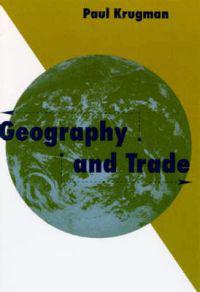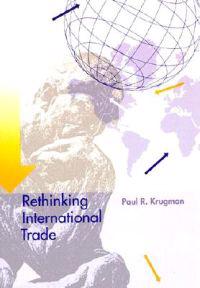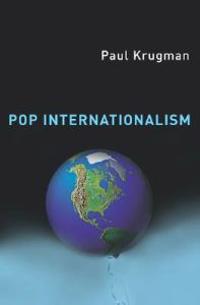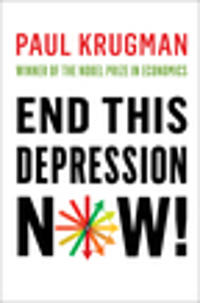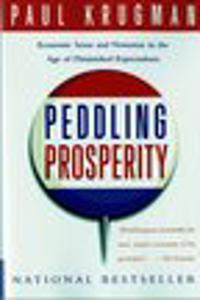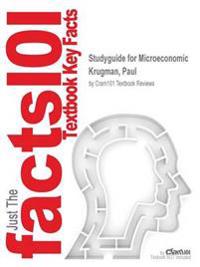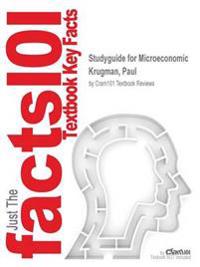Geography and Trade (Häftad)
avPaul R. Krugman
ISBN: 9780262610865 - UTGIVEN: 199302"I have spent my whole professional life as an international economist thinking and writing about economic geography, without being aware of it," begins Paul Krugman in the readable and anecdotal style that has become a hallmark of his writings. Krugman observes that his own shortcomings in ignoring[...]
Rethinking International Trade (Häftad)
avPaul R. Krugman
ISBN: 9780262610957 - UTGIVEN: 199405During the 1980s and 1990s a small group of economists challenged traditional wisdom about international trade. This book provides an account of this research programme and traces the key steps in a trade theory that offers new arguments against free trade.[...]
Currencies and Crises (Övrig)
avPaul R. Krugman
ISBN: 9780262611091 - UTGIVEN: 1995-04-12Paul Krugman's first collection of essays, Rethinking International Trade, mounted a spirited assault on established trade theory and proposed an alternative approach to account for increasing returns and imperfect competition. Less theoretical and more embedded in real-world experience, this new co[...]
Pop Internationalism (Häftad)
avPaul R. Krugman
ISBN: 9780262611336 - UTGIVEN: 199704"Pop internationalists" -- people who speak impressively about international trade while ignoring basic economics and misusing economic figures are the target of this collection of Paul Krugman's most recent essays. In the clear, readable, entertaining style that brought acclaim for his best-selling[...]
The Age of Diminished Expectations (Pocket)
avPaul R. Krugman
ISBN: 9780262611343 - UTGIVEN: 1997-08-08Development, Geography And Economic Theory (Pocket)
avPaul R. Krugman
ISBN: 9780262611350 - UTGIVEN: 1997-09-30Why do certain ideas gain currency in economics while others fall by the wayside? Paul Krugman argues that the unwillingness of mainstream economists to think about what they could not formalize led them to ignore ideas that turn out, in retrospect, to have been very good ones. Krugman examines the [...]
End This Depression Now! (Inbunden)
avPaul R. Krugman
ISBN: 9780393088779 - UTGIVEN: 201204The Great Recession is more than four years old - and counting. Yet, as Paul Krugman points out in this powerful volley, "Nations rich in resources, talent, and knowledge - all the ingredients for prosperity and a decent standard of living for all - remain in a state of intense pain." With character[...]
Peddling Prosperity (Häftad)
avPaul R. Krugman
ISBN: 9780393312928 - UTGIVEN: 199505The low-growth years of the past two decades have produced an intense, fascinating debate between economists of rival ideologies. Sadly, they have also produced the policy entrepreneur - the economic snake-oil salesman who offers easy answers to hard problems.[...]
Economics (Pocket)
avPaul R. Krugman, Robin Wells, Kathryn Graddy
ISBN: 9780716799566 - UTGIVEN: 2007-04-30Talks about introductory economics, using a story-telling approach which makes economic theories easier to understand and absorb. This text also brings together an international scope of real world examples and economic theory, which students may apply to their everyday lives.[...]
Studyguide for International Economics: Theory and Policy by Krugman, Paul R., ISBN 9780132146654 (Övrig)
avCram101 Textbook Reviews
ISBN: 9781467265959 - UTGIVEN: 2013-01-17Studyguide for International Economics: Theory and Policy by Krugman, Paul R. (Häftad)
avCram101 Textbook Reviews
ISBN: 9781478469865 - UTGIVEN: 2013-05Studyguide for Microeconomic by Krugman, Paul, ISBN 9781464143878 (häftad)
ISBN: 9781497079878 - UTGIVEN: 2016-06Studyguide for Microeconomic by Krugman, Paul, ISBN 9781464143847 (häftad)
ISBN: 9781538830086 - UTGIVEN: 2016-12The Return of Depression Economics (Pocket)
avKrugman, Paul R
ISBN: 9781846142390 - UTGIVEN: 2008-12-04Paul Krugman, winner of the 2008 Nobel Prize in economics, shows how today's crisis parallels the events that caused the Great Depression - and explains what it will take to avoid catastrophe. In 1999, in "The Return of Depression Economics", Paul Krugman surveyed the economic crises that had swept [...]

